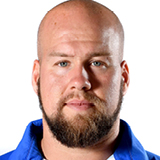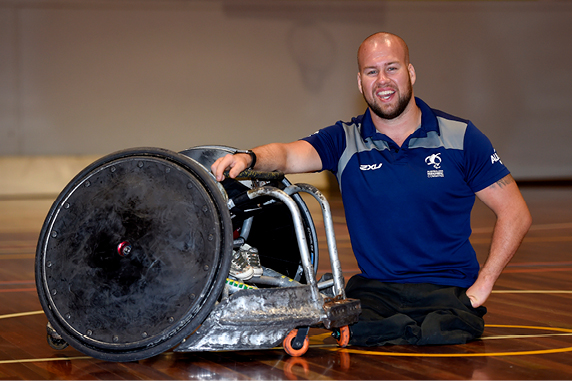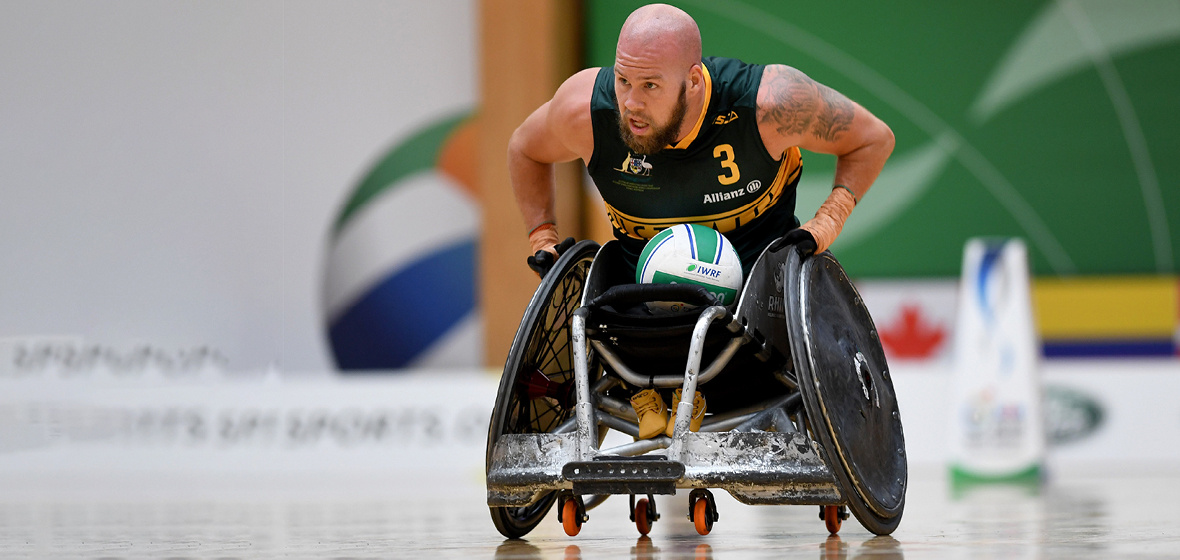“I’m a people person – I love to make people happy and communicate. But I don’t go out there and say, ‘I’m going to go out and inspire these troops.’ I think a leader does that automatically. Maybe I’ve been doing it already and just overlooking it.”
The last 12 months have been immensely challenging for all Australians. LSJ looks beyond the legal profession to unearth valuable leadership lessons from those shining through the mire.
RYLEY BATT: Co-captain of the 2021 Australian Paralympic Team, captain of Australian wheelchair rugby team the Steelers
BANG – ZZSSHH – CLANK.
Metal clangs metal. Rubber wheels skid across linoleum. Skin, tendons and bones rattle in between. The game they call murderball is underway.
There’s a minute on the clock in the gold medal game of the 2016 Rio Paralympic Games’ Wheelchair Rugby. The score is 58-58: defending champions Australia are equal with rivals USA in the second round of overtime.
Captain of the Australian team Ryley Batt, a slab of muscle on wheels whose tree-trunk arms more than make up for a limb deficiency that prevented his legs growing at birth, has caught a bouncing lob pass from his teammate Chris Bond. He heaves his chair across the goal line with one minute to go and screams at his players to lock down the USA’s counterattack. The Aussies desperately barricade their chairs around the ball-carrier until the final siren. REEOOOOOWW.
They’ve done it. Batt throws his arms in the air, cops a late tackle from a US player and goes skidding to the floor, arms still raised in celebration. The Australians become the first team to claim back-to-back gold medals in Paralympic Wheelchair Rugby.
That moment of elation colliding with sheer physical exhaustion was the last time Batt wheeled his chair on a Paralympic court. After five years of waiting for Tokyo, including an unexpected year of indefinite hiatus due COVID-19, the 32 year old is itching to get on the world’s biggest sporting stage for what might be his final Paralympics.
Speaking to LSJ three months out from the delayed 2021 Games, Batt reveals he is still recovering from dislocating his shoulder during that last exchange in Rio when the US player delivered what could be construed as a cheap shot after the siren. He laughs when I reveal I’ve gone down a YouTube rabbit hole in mesmerised shock, watching highlights – mostly collisions – of wheelchair rugby. I’m left with little wonder why it’s dubbed “murderball”.
“You do get broken ribs and hands, occasionally,” he admits. “They call it rugby because of the contact element. It’s not exactly like rugby but it’s totally legal to knock people out of chairs and so on.”
For the uninitiated, wheelchair rugby is a mixture of basketball, gridiron and handball played on wheelchairs. Five players take the court for each team and try to pass and carry the ball over the try line at one end of the court, earning a point for each successful try. Defenders bang their chairs into opposing players and try to turn the ball over.
 Ryley Batt
Ryley Batt
Batt took up the sport when he was 12, a reluctant participant at first because he felt wheelchairs emphasised his limb deficiency. He preferred to push himself around on a skateboard with the other kids. However, once he was comfortable in the chair, his progression was lightning quick. He debuted in the Australian Paralympic team at just 15 years old – the youngest Paralympic athlete in history.
“When I found the sport of wheelchair rugby and learned to accept my disability and who I was, it was great,” Batt says. “Getting around in a wheelchair made things a lot easier. The sport has given me so much – being able to travel the world, meet new people, new situations.”
Batt earned the nickname “Battman” among sports commentators, which is fitting for dual reasons that he’s built like Christian Bale in The Dark Knight, and because he clearly thrives in a physical battle. But unlike Batman, he’s never been a lone operator. This year will be Batt’s fifth Paralympics and he heads to Tokyo as captain not only of the Australian wheelchair rugby team, the Steelers, but as co-captain of the broader Paralympic team alongside six-time wheelchair tennis Paralympian Danni Di Toro.
“Those captaincies set different tasks for me,” Batt tells LSJ over a Zoom call from his home in Port Macquarie.

“Previously in wheelchair rugby, I could just sort of focus on my own game, to be best for the team. Now, I have to focus more on the whole team, on teamwork and everyone’s emotions and attitudes, so we can succeed together. Everyone has an opinion and needs to be heard.”
Batt takes the leadership baton from legendary Australian wheelchair racer and three-time Paralympic gold medallist Kurt Fearnley. They’re big shoes to fill, figuratively speaking of course, because neither athlete cares much for shoes. Batt says he was surprised and humbled to accept the role.
“Leadership is something I never considered, the captaincy [of the Paralympic team] was never something I thought I’d be in the mix for,” he says.
“I’m a people person – I love to make people happy and communicate. But I don’t go out there and say, ‘I’m going to go out and inspire these troops.’ I think a leader does that automatically. Maybe I’ve been doing it already and just overlooking it.”
I point out that surely some leadership traits must have sunk in through taking cues from legends like Kurt Fearnley for almost two decades. There’s a pause before Batt agrees. He adds that his childhood in an empowering and physically active family taught him to lead his own story with a “can do” approach to life.

“There was one time my dad took me down to the beach and threw me onto the soft sand. He said let’s go for a swim,” recalls Batt.
“I looked up at him and sort of said, ‘Can you please carry me?’ He said, ‘nah, make your way down there’. So, I dragged myself down to the water, looking like a crumbed cutlet. People were all around probably thinking, you absolute asshole of a man making your disabled son crawl. But I got to the water, and that was a life lesson for me.
“My pop was another huge influence in my life, he bought me my first quad bike. Pop showed me how to look at my abilities in life, not disabilities. And that is something I always hold onto.”
That day at the beach flipped a switch in Batt’s mind. He says his thought processes went from “I can’t do X” to “How can I do X?” The evidence of it is clear in his passion for all things fast and adrenaline fuelled. When not training for the Paralympics he spends his downtime quad biking, water-skiing, surfing and doing CrossFit.
Batt’s love for sports even introduced him to now-wife Crystal, whom he met at a gym. Together they taxi around Crystal’s two daughters and will be opening a CrossFit gym in Port Macquarie soon. It’s part of his post-Paralympic plan to transition into working with adaptive athletes and young people with disabilities.

“I love to mentor kids with disabilities or who are overcoming suffering, injury or illness. It’s something I’m very passionate about,” Batt says.
“Because with a disability, sometimes you can hide in a shell like I did. I want kids to enjoy life and embrace it. As you grow older you learn this is it; this is life, and you either embrace it or you stay miserable.
“The only regret I have in life is that I didn’t accept my disability earlier.”




